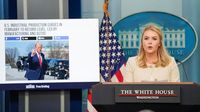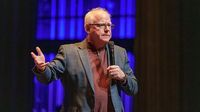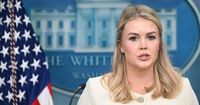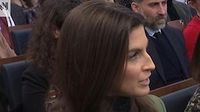In a series of contentious press briefings this week, White House Press Secretary Karoline Leavitt found herself at the center of public scrutiny after making a series of slip-ups that fueled widespread criticism and mockery.
On March 19, 2025, Leavitt claimed that President Donald Trump is "committed to passing a big reconciliation package later this year," which reportedly includes "ending no taxes on tips." This statement quickly drew attention for its apparent double negative, which critics argued contradicts Trump's promise during his 2024 election campaign to abolish taxes on tips. As one observer quipped on social media, "So not committed to ending taxes on tips, but committed to ending no taxes on tips. So he’s committed to ending his own policy that he never instituted in the first place, got it."
Just two days earlier, on March 17, Leavitt made headlines again when she claimed the Department of Justice would focus on "fighting law and order." Critics pointed out that the remark likely should have been "fighting for law and order," highlighting a pattern of miscommunication that has left many both amused and concerned about the accuracy of information coming from the White House.
In the midst of these gaffes, Kaitlan Collins, CNN's Chief White House Correspondent, was absent from the briefing shortly after her clash with Leavitt. In their previous encounter, Leavitt had dismissed Collins' inquiry about potential legal issues surrounding President Biden's use of an autopen for last-minute pardons by quipping, "You're a reporter, you should find out," a response that many viewed as dismissive and unprofessional.
Leavitt's underlying confrontational approach seems to have solidified her role as a combative spokesperson, often sparring with reporters over challenging subjects. During a particularly difficult briefing last month, Collins questioned why the White House had barred the Associated Press from attending press events, prompting an equally brash response from Leavitt who said that attending a briefing was a "privilege" and insisted that "nobody has the right to go into the Oval Office and ask the President of the United States questions." This engagement only heightened perceptions of an administration increasingly at odds with established press norms.
As tensions rose, President Trump weighed in on the controversy surrounding Judge James Boasberg, who recently issued a ruling barring the deportation of more than 200 individuals under the recently invoked Alien Enemies Act. Trump denounced Boasberg as a "radical left lunatic," further politicizing the judicial process and fueling calls for the judge's impeachment from certain factions within Congress. Leavitt followed suit, labeling Boasberg an "activist judge" following his ruling.
Specifically, Leavitt pointed out Boasberg's appointment by President Obama and commented on his wife’s political donations, stating that these affiliations revealed a bias against Trump's policies. "This judge, Judge Boasberg, is a Democrat activist. He was appointed by Barack Obama," Leavitt claimed, asserting a need for challenging judicial independence. Judge Boasberg's ruling, which has been described as "an egregious abuse of the bench" by Leavitt, came after the administration utilized the Alien Enemies Act, which has only been activated three times in U.S. history. His ruling ignited further claims from right-wing commentators and politicians, including Representative Brandon Gill of Texas, who announced plans to file articles of impeachment against the judge.
The escalating situation has prompted Chief Justice John Roberts to publicly caution against retaliatory measures such as impeachment of judges who issue unfavorable decisions. In a rare public remark, Roberts stated that "for more than two centuries, it has been established that impeachment is not an appropriate response to disagreement concerning a judicial decision," directly countering Trump's vitriol surrounding judicial rulings.
Adding fuel to the fire, Trump took to social media to voice his continued discontent with Boasberg, stating, “If a President doesn’t have the right to throw murderers, and other criminals, out of our Country because a Radical Left Lunatic Judge wants to assume the role of President, then our Country is in very big trouble.” His remarks reflected an ongoing narrative that paints the judicial branch as an obstructive force against the Trump administration's objectives.
Supporting this narrative, Trump’s allies, including billionaire Elon Musk, have openly called for action against judges. Musk has made posts arguing that judges who undermine the democratic will of the people should be held accountable, further complicating the relationship between lawmakers, media, and the judiciary.
In the backdrop of these developments, any expectations for civility within the press room seem fortified by Leavitt's combative style. Noted for her frequent spats with reporters, Leavitt's confrontations suggest a pattern of dismissiveness toward journalism that does not align with the administration’s narrative.
Leavitt's remarks have left many questioning the administration's commitment to transparency, while also spotlighting the complicated landscape of U.S. immigration policies and their legal ramifications. Even as her responses draw ire, they illustrate a strain on the relationship between the White House and the Fourth Estate, raising alarm about the future of press freedom and the delicate balance of powers at play in the current political environment.





